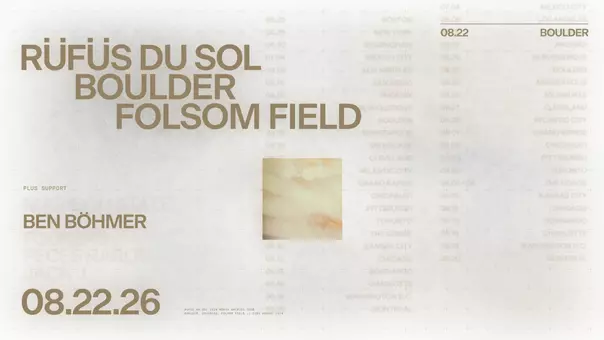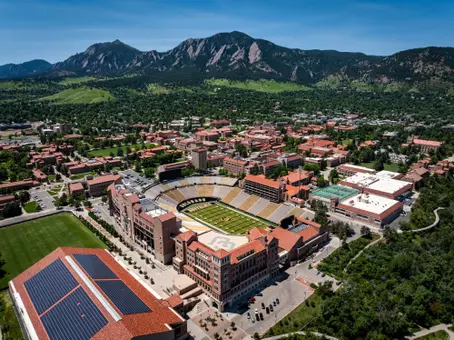Colorado University Athletics

As CU Plans For Next Fiscal Year, AD George's Top Priority Still Student-Athletes
April 16, 2020 | General, Neill Woelk
BOULDER — While the college sports world has been turned upside down — and no one knows when things might return to anything resembling even a "new normal" — one thing hasn't changed for University of Colorado Athletic Director Rick George.
George's top priority continues to be the Buffaloes' student-athletes. That means as the CU Athletic Department's administration goes through the budget process for next year, officials are doing their best to ensure there will be no adverse changes for CU athletes.
"My first priority is to make sure that the support areas that we have for our student-athletes — mental health, academics, nutrition, leadership and career development, sports medicine, all of those areas — don't change," George said in a Thursday afternoon conference call with the media. "We have to make sure we provide the same level of support that we always offer. We tell them we're going to create a world-class experience for them, and those are areas that will be my priority."
CU Athletics is in the process of budgeting for the 2020-21 fiscal year, a process that involves countless scenarios because of the pandemic. As it stands now, nobody knows when or if the college football season will begin, meaning athletic departments across the nation have no idea how the future of their biggest revenue producer will be impacted. The same goes for every other sport.
Thus, those athletic departments — Colorado included — are trying to prepare for as many scenarios as possible. That includes everything from the football season starting on time to the season starting later in the fall, to perhaps even next spring, as well as possibly playing in empty stadiums — or maybe no football at all until 2021.
"There are so many different scenarios out there," George said. "You guys (the media) have all written about them, you've read them all. We've got to focus on certain areas we think are more likely. What those are today, I couldn't tell you — but by the end of May we may have a better idea what those scenarios look like. It's challenging to figure that out. I've got a good team together that's looking at all that … There's a lot of discussion. It's hard to plan for a scenario you don't know. There's a number of scenarios that could fall into a couple different categories. We're just looking at it all right now and we're going to make the decisions we think are best that fit the scenarios we have to lay out."
But while some schools are already cutting sports as a money-saving measure, George said that's not an option he is considering.
"Eliminating sports is not at the top of my list," he said. "Right now, we don't have a sport that we would cut. We're planning a variety of different scenarios based on what's ahead of us. Nobody can predict what's ahead of us … Our process has been methodical and thoughtful because we want to make the right decisions as we move forward based on the scenario that plays itself out. We're working through that. At the appropriate time we will make those. But I can tell you that eliminating a sport is way, way, way, way down the list."
While CU administrators are busy trying to predict the future and plan a budget accordingly, they are also making sure student-athletes this year are finishing on a strong note via remote classes.
"Our student athletes continue to be doing well," George said. "We're in Week 13 of 15 weeks of the academic semester. We continue to provide support for our student athletes academically through tutorials and study tables, and our coaches have really been engaged in this process as well. I met with our academic staff yesterday and had a really good conversation about what they're doing and how that's going. I feel really good about what we're doing academically … We're just trying to engage our student athletes as much as we can to make sure their health and wellness is where it should be. From that perspective I would tell you things are going well."
George touched on a wide range of topics during the 40-minute call. Some of the other issues he addressed:
— CU will support seniors from this year's spring sports who missed their final season if they want to return next year. The NCAA recently voted to allow those seniors an extra year of eligibility if their respective schools permitted them to return.
"We've made the decision that we're going to support our spring sport student athletes that decide to come back," George said. "Our coaches are in the process of having those discussions with their student athletes. We made the decision a couple days ago in consultation with our chancellor (Phillip DiStefano) … I talked to our coaches and informed them of my decision on Monday, so they're having conversations with those student-athletes right now. I'm sure a number of those student-athletes are going to want to come back and we want them to come back. I think it's the right thing for us to do. Our coaches are on board and I think they've embraced it."
— George said CU men's basketball coach Tad Boyle declined a $105,000 bonus that was in his contract for qualifying for the NCAA Tournament. While the tournament was canceled this year, the overwhelming consensus was that the Buffs would have earned an at-large berth. Thus, George offered Boyle the bonus.
"I did offer Tad the (NCAA) bonus based on the principle that we felt like he earned it," George said. "But Tad declined it. He preferred that we use it in other areas that would help us during this crisis. It speaks to who Tad is. I thought he earned the bonus and it was offered to him and he declined it."
— Despite the problems caused by the pandemic — including a greatly reduced NCAA distribution this year and the loss of other revenue — George said CU's budget should finish in the black this fiscal year.
"We've had to eliminate all of our on-campus events, which is a hit to us from the revenue perspective in this fiscal year," George said. "We know the NCAA's distribution is going to be significantly less. We've looked at all of that and we still believe that we will be in the black. I'm confident of that."
— Some athletic departments around the nation have seen athletic directors and coaches take voluntary pay cuts as cost-saving measures, and George said those discussions have taken place at CU.
"Certainly everything is on the table," he said. "We're having those discussions and we're talking through what that might look like. But again we're trying to be methodical in our approach to this … I would absolutely be the first one to take a pay cut."
— George was asked several different times what he thought the next football season would look like, but he said it was too early to speculate publicly. Instead, he said, CU wants to plan for the "likely" scenarios.
"We've got groups that are working on what all those different scenarios look like from a competitive standpoint," he said. "We're not just talking about football, we're talking about all fall sports. If football doesn't play or it's pushed back, it would be very similar to all of our other fall sports … Certainly football we know is significant because of the revenue that it generates. We're looking at that closely. We're also looking again as we go through these different scenarios, the health and safety of our student-athletes is primary. We're looking at acclimatization periods for that— how much time would you need to get your student-athletes physically ready? That goes into play as well."
And the timing, he said, is still anyone's guess.
"Could the season be pushed back? That's a scenario," he said. "Could it start on time? That's a scenario. There's a lot of things out there that are being discussed. We've got a group and we're looking at all of those different scenarios. It's like planning for your budget for next year. You have to have a little more certainty on what it may look like before you can finalize what that would actually look like."
— George also noted that the NCAA approved increasing up the time coaches can spend with athletes on a "virtual" basis to eight hours per week for instructional periods. Under normal circumstances, that instructional number is two hours in the offseason. The NCAA moved it up to four hours a couple of weeks ago, and has now made it eight — the number of overall hours coaches usually get with players for offseason strength and conditioning as well as instructional time.
"These eight-hour weeks of virtual, non-physical countable activities include film review, chalk talk, team meetings, and also to provide them one day off per week," George said. "That's going to be really good for our coaches to have four more hours of interaction with their student athletes. I was really glad we came to that decision."
— Other budget considerations. Thursday, CU announced that the concerts by the Dead and Co. scheduled for July have been canceled, a revenue hit for CU Athletics. George said they are talking with promoters about other dates … George also said that the department is considering extending the season ticket renewal deadline again (it was previously extended into May), and they are putting together different pricing structures and payment plans to work with fans. "We're going to continue to sell tickets and then we'll have to make some determinations as we get a little bit clearer on what the future looks like," he said.
Contact: Neill.Woelk@Colorado.edu





